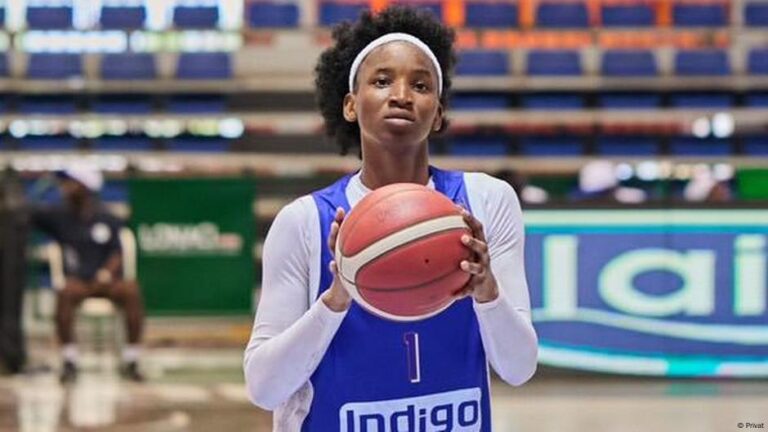It is no small matter that Djelika “Mami” Tounkara has lost her anonymity.
“I am afraid,” Tounkara told DW. “Before my name went public, I had already received death threats. Now, I will need more protection, but I have never had any. So, even though I am afraid, I want to talk, to express myself because I want to protect others.”
Her name became public in a decision published by the Court of Arbitration for Sport (CAS) in June, but her fight for justice began in 2021 when she rejected and then reported the sexual advances of her former head coach at the Malian Basketball Federation (FMBB).
The coach was later charged, arrested and jailed in July 2021 for pedophilia, attempted rape and molestation of other victims.
Shortly afterwards, the talented teenager lost her place in the squad for the U18/U19 World Cup in Hungary in August 2021, which she and her lawyers claim was direct retaliation for reporting abuse.
“The federation [FMBB] tried to shut me up when I spoke up at the time,” said Tounkara, now 21. “Even just for that, I didn’t receive any support from FIBA [basketball’s world governing body].”
Tounkara also said the threats made her feel that she had to leave the country for her own safety.
CAS rules it does not have jurisdiction
Tounkara’s decision to speak to DW came after yet another setback in her quest for FIBA to acknowledge the harm she has been subjected to for becoming a whistleblower.
In its decision published last month, the CAS ruled it did not have jurisdiction to hear an appeal by Tounkara.
Tounkara had turned to the CAS after years of seeking justice within numerous FIBA legal mechanisms as she sought remedy for opportunities denied to her.
In August 2021, she filed a case with the FIBA Ethics Panel, claiming the FMBB had unfairly dropped her from the national team.
A ruling was delayed by the deaths of three of the five members on the panel, leaving Tounkara the choice of either the two remaining members delivering a ruling or waiting until at least mid-2023 when new panel members would be appointed. Not wanting to wait, Tounkara took the decision to FIBA’s Appeals Panel. It was after this appeal was rejected in 2024 that her lawyers turned to CAS.
“I’m disappointed that the CAS only focused on the technical details,” she said. “FIBA still do not speak about my safety and the safety of the other girls in our country who were abused at the time. CAS believed me, but again they have not done anything to help me at the end.”
A ‘maze of internal legal processes’
William Bock III, who signed on as one of Tounkara’s lawyers in 2022, sees the CAS’ decision to accept FIBA’s request to rule the court does not have jurisdiction as a significant blow.
“It’s the most disappointing result I’ve ever had as a lawyer because of the enormity of the wrongs that ‘Mami’ has already experienced,” Bock told DW. “We’ve spent four years trying to undo some of the harm that FIBA did by failing her and we’re caught in their maze of internal legal processes that we may never get out of.”
This is because when the CAS ruled that it didn’t have jurisdiction, it referred the case back to FIBA’s Ethics Panel.
Bock and Tounkara’s other lawyers have worked pro bono for years seeking to remedy the opportunities they believe she was denied by not being allowed to participate in the 2021 U18/U19 World Cup. Her career was put on hold for over two years, as the death threats she received in Mali confined her to her house and resulted in a significant deterioration of her mental health.
Opportunities denied
“Mami’s a young woman, but every year that goes by, she loses more of the opportunities that were taken away from her by not being able to participate at a very important point in her career,” Bock said.
“Especially in a world event that would have allowed her to be seen by scouts from the United States and around the world. She might have had a chance to have a much better basketball opportunity if FIBA had quickly realized that she was the subject of retaliation.”
Ahmar Maiga, the founder and executive director of the nonprofit organization Young Players Protection Association in Africa – Mali (YPPA-Mali), was the first to report the abuse and remains skeptical about FIBA’s genuine desire to help Tounkara.
“She [Tounkara] spoke up and because of the truth, she paid a lot for that,” Maiga said. “In her career and in her personal life. FIBA has always preferred business to safety. It is all about business and politics, and not about the safety of players.”
Determined to fight on
With the case back at the FIBA Ethics Panel, there is no indication of when a decision on the player’s appeal could be issued. Responding to a query from DW, FIBA simply confirmed that the CAS had referred the case back to the Ethics Panel.
Despite being exhausted by the fight and in constant fear for her life, Tounkara remains resolute in continuing along her current path, not for the betterment of her life but for young girls hoping to follow their own basketball dreams in Mali.
“I always hope for justice,” she said. “For me, that justice would be a change that protects the youth and our little sisters in the future.”
Edited by: Chuck Penfold


